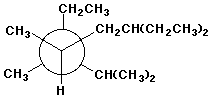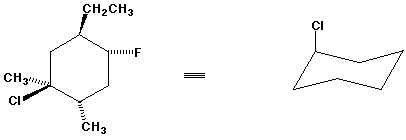Organic Chemistry |
||
Professor Carl C. Wamser |
||
Chem 334 - Fall 2003 |
EXAM 1 |
![]()
Organic Chemistry |
||
Professor Carl C. Wamser |
||
Chem 334 - Fall 2003 |
EXAM 1 |
![]()
1. (15 points) Write complete names for each of the following structures:
a) 
b) 
c) 
2. a) (3 points) Write an example of a spirocyclic hydrocarbon containing six carbons.
2. b) (3 points) Write an example of a bicyclic hydrocarbon containing six carbons.
3. a) (4 points) Give the molecular formula for the compound below.
3. b) (5 points) Put an asterisk ( * ) next to each sp2 carbon atom.
3. c) (5 points) Put a circle ( ° ) next to each sp3 carbon atom.
4. a) (5 points) Write the best Lewis structure for nitromethane, CH3NO2 , a racing fuel.
Show all bonds and all lone pairs.
b) (2 points) Write another good resonance form for nitromethane and compare
its relative stability to the structure above.
c) (2 points) Describe the hybridization and structure at C .
d) (2 points) Describe the hybridization and structure at N .
e) (4 points) Draw the full structure, in particular showing the three-dimensional arrangement at C and at N .
5. (15 points) Complete each of the reactions below, using a balanced
equation and only a simple acid-base reaction. You must decide which
compound is more
likely to act as the acid or base in each case. Write the pKa values
under each acid and predict the preferred direction of the acid-base
equilibrium.
a) ![]()
b) ![]()
c) ![]()
6. (10 points) For each of the structures below, the structure on the left is complete and the structure on the right is intended to be exactly the same structure but missing various components. Complete the structures on the right by adding the missing components in the proper locations.
a) 
b) 
7. (10 points) For each of the structures below, the structure on the left is not the most stable form of the molecule. On the right, complete the most stable structure of the same molecule.
a) 
b) 
8. a) (9 points) Write good Newman diagrams for the three staggered conformations of 2-methylbutane, looking down the C2-C3 bond (C2 in front).
b) (6 points) Write an approximate potential energy diagram that indicates
the relative stabilities of the three forms and the relative energy barriers
for rotation between them.
![]()